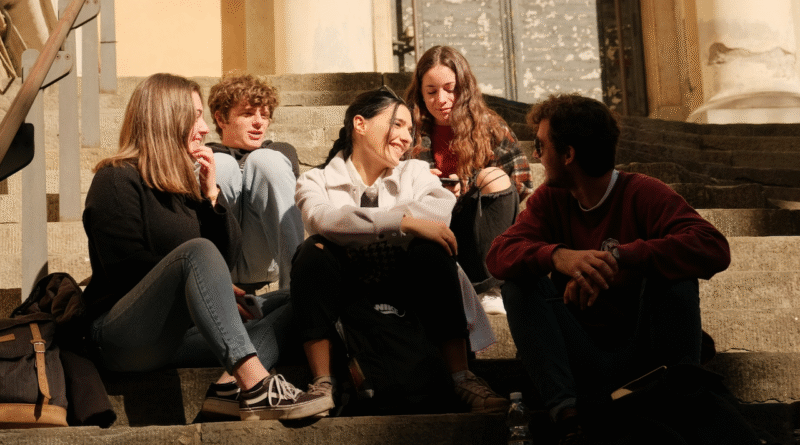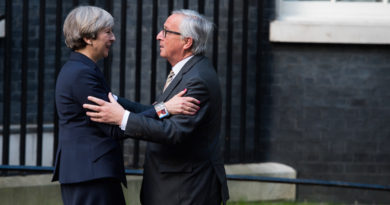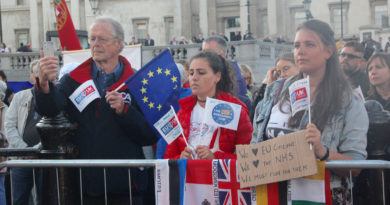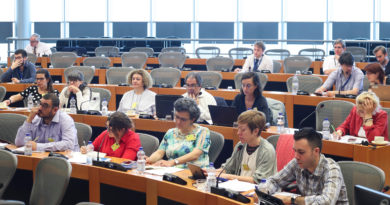“People at the centre”: what’s in the EU-UK post-Brexit ‘reset’ deal
The UK and the EU have agreed to set up a much-awaited scheme for “youth experiences” across the Channel, as part of a post-Brexit ‘reset’ deal announced on Monday. The UK will also re-join the EU Erasmus+ programme. The detailed terms of these arrangements, however, have to be defined in further talks and no time frame has been specified yet. This is what we know so far.
The deal was revealed during a meeting of EU and UK leaders in London, the first summit since the UK left the European Union.
It concerns collaboration on security and defence, and lists a wide range of areas in which the UK and the EU intend to build closer links in the future.
EU Commission President Ursula von der Leyen said the agreement was a chance to open a “new chapter” in EU-UK relations.
In a significant move compared to the past, one of the sections is about “putting people at the centre” of the relationship and deepen “people-to-people ties, particularly for the younger generation”.
‘People at the centre of the relationship’
The end of free movement between the UK and the EU has led to major changes in how people can travel and work across the Channel, an area now governed by national immigration policies.
Young people, from students to au pairs and ski instructors, are among the most impacted by these restrictions.
At the summit, the EU and the UK agreed to develop a “youth experience scheme” that will partly overcome the situation without restoring free movement.
According to the plan, people between 18 and 30 years old will be able to travel, study, work or volunteer in each other’s territories “for a limited period of time”. A specific visa route will be created for this purpose.
The scheme will be “capped” and “mirror existing schemes the UK has with countries such as Australia and New Zealand,” the British government said. The UK currently has youth mobility schemes with 11 countries and 2 territories. These can last for up to 2 years.
After Brexit, the UK proposed similar arrangements to some EU member states. To guarantee equal treatment for young people from all EU countries, last year the European Commission proposed an EU-UK scheme that would allow 18-30 years old to stay for up to 4 years in the destination country and take up any activity without being subject to quotas. According to the Daily Mail, the UK intends to cap the scheme at 100,000 EU participants per year.
Under the Commission proposal, visa fees would not be “excessive”, EU participants would pay local university fees and would be exempted from the UK healthcare surcharge. At present, the UK youth mobility fee is £319 and a UK student visa costs £524, in addition to a £776 annual fee for healthcare.
The UK and the EU will have to agree the conditions of the new scheme somewhere between these positions.
Erasmus+ programme
With Brexit, young Britons had lost the opportunity to participate in the Erasmus+ programme, as did Europeans studying in the UK.
As part of the deal, the UK is set to re-join the flagship initiative, which involves “exchanges for students, at university and other academic levels, exchanges and training activities for academic staff, cooperation among higher education institutions, youth exchanges, and the support for the professional development of sport staff.”
The timeline and the conditions, including the UK’s financial contribution to the programme, remain to be specified.
Several members of the European Parliament had called for the UK to return into the Erasmus+ during a debate ahead of the summit.
At the press conference presenting the deal, Ursula von der Leyen remembered her time as a student in London. “From that experience, I know that the first place when you go abroad as a young person leaves an impression for life. You fall in love with the city and the country. And for the rest of your life, you are the best ambassador for that country,” she said.
“Therefore, I am so glad that we have agreed that we will have Erasmus+ for young people and that we will work towards a youth experience scheme, just about this experience. This will allow the next generation to once again live and study in each other’s countries, and this will build friendships that will last a lifetime,” she added.
Simon Usherwood, Professor of politics and international studies at the Open University, wrote on The Conversation that “there’s still a very long way to go before anyone gets to use the scheme in practice” and that “the British participation in the Erasmus+ scheme for student mobility might be a partial stopgap, making exchanges within study programmes easier.”
Trade and travel
With regard to trade, the UK and the EU have agreed to set up “dedicated dialogues” to resolve issues related to short term business visits.
This concerns the recognition of professional qualifications for some regulated professions, and the requirement for EU service suppliers to apply for visas under the UK sponsorship scheme.
Another area of the deal concerns agrifood trade. Since Brexit, UK agrifood exports to the EU dropped by 21% and imports by 7%, the government said. A future sanitary and phytosanitary agreement will remove large parts of checks and certificates for the trade of animal and plant products, with the expected result of increasing supplies and lowering prices of food in the UK.
However, this will require that the UK follows the EU rules regarding food production, with the resolution of disputes under an independent arbitration panel and the final oversight of the European Court of Justice.
As part of these arrangements, the UK government also announced the introduction of ‘pet passports’ for UK cats and dogs “eliminating the need for animal health certificates for every trip” in Europe.
E-gates
The UK government said that British holidaymakers “will be able to use more e-gates” when travelling in Europe, “ending the dreaded queues at border control.” Some EU countries already allow UK citizens to use e-gates and the UK government wants to convince more to do so.
In autumn, the EU should introduce its new digital border system, the EU Entry/Exit System (EES). The EES will replace the stamping of passports with digital records every time non-EU short-term travellers enter and exit the Schengen area. All non-EU citizens should be able use e-gates under the scheme.
Justice and home affairs
In the area of justice and home affairs, the UK and the EU will negotiate the possibility to exchange facial images, in addition to fingerprints, DNA, and criminal records of third country nationals, and increase cooperation in tackling irregular migration.
They will also complete the exchange of vehicle registration data, which will allow UK and EU authorities to identify drivers and deliver fines for traffic offences committed in each other’s territories. Since Brexit, there was no official mechanism for police forces to exchange such information, making it difficult to prosecute driving offences.
The document notes that as of July 1st, the UK will join the Hague Convention on Recognition and Enforcement of Foreign Judgments in Civil or Commercial Matters, which will simplify the mutual recognition of decisions on family law, including divorces and child custody.
Rebuilding ties
The UK and the EU also agreed to cooperate on health threats and pandemics, to ensure the UK participation in the EU’s electricity market, and access to UK waters for European fishermen.
The new agenda adds to the current arrangements governing the EU-UK relationship. These include the Withdrawal Agreement protecting the rights of EU citizens in the UK and Britons in the EU, the Trade and Cooperation Agreement defining the post-Brexit trade relationship, and the Windsor Framework, concerning trade with Northern Ireland.
“These agreements represent more than just words on paper. They are a reflection of our shared commitments — to security, to prosperity, to development, and to the people we serve on both sides of the Channel. Our relationship is grounded in shared values, mutual interests, and the simple fact of our geographical closeness. We are neighbours, allies, partners. And we are friends,” said after the summit EU Council President António Costa.
Claudia Delpero, Europe Street News © all rights reserved




